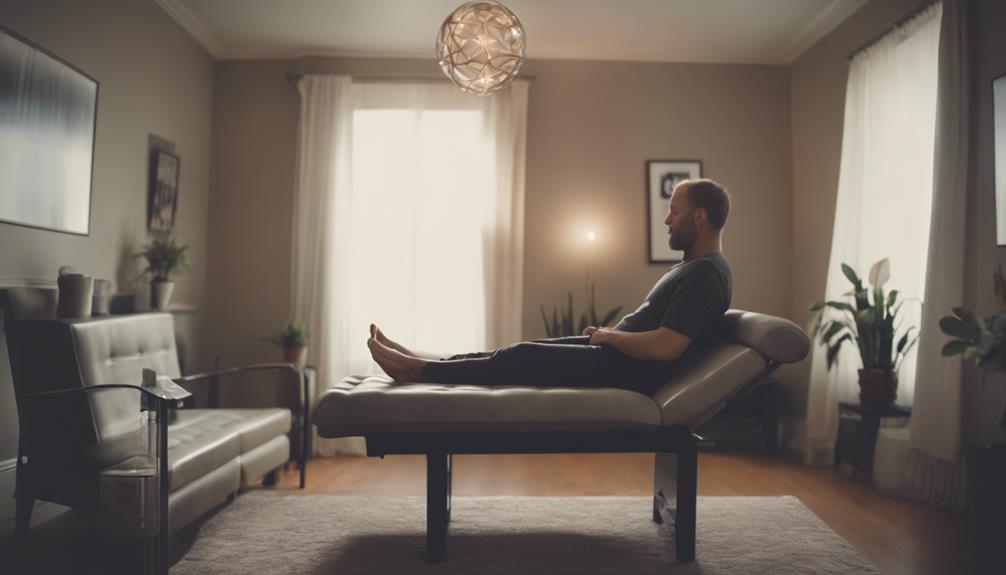
Discover the transformative power of hypnosis for anxiety relief. Hypnosis works by rewiring negative thought patterns and inducing deep relaxation, alleviating both physical and mental symptoms of anxiety. Through repeated sessions, the subconscious mind is engaged to promote lasting change and inner peace. By tapping into the subconscious, hypnosis offers a holistic approach to managing anxiety triggers effectively. Certified hypnotherapists provide safe and effective guidance, helping individuals combat social anxiety and panic attacks. Uncover how hypnosis can reframe negative thought patterns and promote resilience. Reveal the potential for a calmer, more tranquil mindset.
Key Takeaways
- Hypnosis rewires negative thought patterns for anxiety relief.
- Brainwave activity changes induce calmness and receptivity.
- Relaxation response induction reprograms maladaptive beliefs.
- Subconscious mind reprogramming offers lasting anxiety management.
- Guided imagery aids in stress reduction and confidence promotion.
Understanding Hypnosis for Anxiety Relief
In the realm of mental health and wellness, understanding hypnosis for anxiety relief offers a profound insight into the transformative power of tapping into the subconscious mind. Hypnosis serves as a natural state of focused concentration, enabling individuals to access their subconscious and reprogram negative patterns that contribute to anxiety symptoms. By engaging with the subconscious mind, hypnotherapy aids in reducing stress levels and alleviating the physical manifestations of anxiety through the use of positive suggestions and guided imagery.
Treating anxiety through hypnosis involves bypassing the critical conscious mind and directly influencing the subconscious to alter the brain's response to anxiety triggers. This approach provides a practical and effective path towards managing anxiety and gaining lasting control over its symptoms. Daily practice of self-hypnosis can further reinforce these positive changes, contributing to habit formation and empowering individuals to utilize hypnosis during anxiety-inducing situations.
Research has shown that hypnosis is not only beneficial for treating anxiety disorders but also effective in addressing phobias and panic attacks. By combining hypnotherapy with life coaching, individuals can receive holistic support to overcome various challenges, including quitting smoking, conquering self-doubt, and enhancing overall mental well-being through the adoption of positive practices. Embracing hypnosis for anxiety relief offers a promising avenue for individuals seeking a thorough and empowering approach to managing their anxiety.
Mechanisms of Hypnosis for Anxiety
Setting out on a journey to delve into the mechanisms of hypnosis for anxiety is akin to uncovering the intricate workings of the mind's healing power.
Within this exploration lie the transformative tools of anxiety reduction techniques, brainwave activity changes, and relaxation response induction.
Anxiety Reduction Techniques
Utilizing the powerful tool of hypnosis, individuals experiencing anxiety can access deeper levels of their mind to rewire negative thought patterns and alleviate symptoms effectively. Through deep relaxation techniques and the repetition of positive affirmations, hypnosis helps in reshaping ingrained responses to anxiety triggers.
By directly addressing the subconscious mind, hypnosis can reduce physical symptoms associated with anxiety disorders, providing a holistic approach to symptom management. Success stories attest to the efficacy of hypnosis in rewiring thought patterns, offering a practical and empowering tool for those seeking relief from anxiety.
Whether through guided sessions or self-hypnosis practices, individuals can establish new habits to navigate anxiety-inducing situations with greater ease, ultimately promoting overall well-being and lasting symptom control.
Brainwave Activity Changes
Through the modulation of brainwave activity, hypnosis serves as a transformative tool in alleviating anxiety by inducing states of deep relaxation and heightened suggestibility. When individuals undergo hypnosis for anxiety relief, there is a noticeable shift in brainwave patterns from beta waves, associated with alertness, to alpha and theta waves linked to relaxation and creativity.
Alpha waves promote a sense of calmness, while theta waves enhance receptivity to positive suggestions, aiding in anxiety management. This change in brainwave activity during hypnosis not only fosters a profound state of relaxation but also increases the individual's openness to beneficial therapeutic interventions.
Research highlights the significant impact of hypnosis-induced brainwave changes, emphasizing its potential to enhance the mind-body connection and alleviate anxiety symptoms effectively.
Relaxation Response Induction
In the context of hypnosis for anxiety relief, the mechanism of Relaxation Response Induction explores deep relaxation techniques to access the subconscious mind for effective anxiety reduction. By inducing a state of profound relaxation, hypnosis aims to alleviate anxiety by addressing negative thought patterns associated with anxiety triggers.
Techniques such as progressive muscle relaxation and guided imagery are employed to engage with the subconscious and reprogram maladaptive beliefs. Through consistent practice, this form of hypnosis can lead to lasting changes in behavior and perception, offering individuals a holistic approach to managing anxiety.
Subconscious Mind in Anxiety Hypnosis
Accessing the power of the subconscious mind is pivotal in understanding and addressing anxiety through hypnosis.
By delving into the subconscious, individuals can unearth deep-rooted patterns that fuel anxiety and work towards calming and reframing these responses.
Exploring the unconscious aspects of anxiety can lead to transformative breakthroughs in managing and alleviating its impact on mental well-being.
Subconscious Role in Anxiety
Harnessing the power of the subconscious mind is pivotal in understanding and addressing anxiety through the transformative practice of hypnotherapy.
The subconscious mind, influencing 95% of our thoughts and behaviors, holds the key to reprogramming negative thought patterns and beliefs that fuel anxiety.
In hypnotherapy sessions, individuals enter a receptive state conducive to exploring the root causes of their anxiety, promoting resilience, relaxation, and positive self-perception.
For lasting relief, repetition of these sessions, typically spanning from 4 to 12 appointments, is essential.
Hypnosis for Calming
Utilizing the power of the subconscious mind, hypnosis for calming offers a transformative approach to reprogramming negative thought patterns associated with anxiety. Through deep relaxation techniques and focused attention, individuals can effectively reprogram their subconscious to alleviate anxiety symptoms. This form of hypnotherapy aims to reduce the fight-or-flight response by teaching the brain new ways to respond to stress triggers.
Key elements of hypnosis for calming include:
- Inducing deep relaxation
- Rewiring the brain's response to stress triggers
- Promoting inner peace through positive affirmations and guided imagery
Unconscious Patterns in Anxiety
How does hypnotherapy reveal the unconscious patterns influencing anxiety relief and the role of the subconscious mind in this transformative process?
The subconscious mind, governing 95% of thoughts and behaviors related to anxiety, holds deep-rooted negative thought patterns.
Hypnotherapy offers a doorway to access and reprogram these patterns, paving the way for lasting relief.
By delving into the unconscious patterns in anxiety through hypnosis, individuals can address the underlying causes, fostering positive changes in habits and resilience.
Through repetition of hypnotherapy sessions and listening to personalized recordings, one can optimize the results in anxiety relief.
Understanding and reshaping these unconscious patterns is key to accessing the potential for a calmer, more empowered state of being.
Hypnosis Techniques for Anxiety Management
Through the application of specific hypnotic techniques, individuals can effectively manage and alleviate anxiety symptoms. Hypnosis serves as a powerful tool to reprogram the mind, creating positive changes in thought patterns and behaviors that contribute to anxiety.
Here are some key hypnosis techniques for anxiety management:
- Guided Imagery: Engaging the subconscious mind through visualization can help individuals confront and reframe anxiety triggers. By envisioning calm, safe spaces or positive outcomes, guided imagery can alleviate feelings of stress and worry.
- Positive Suggestions: By implanting affirmations and positive suggestions during hypnosis sessions, individuals can start to shift their mindset towards one of confidence and tranquility. These suggestions help in rewiring negative thought patterns that fuel anxiety.
- Relaxation Techniques: Hypnosis often incorporates deep relaxation methods like progressive muscle relaxation or controlled breathing exercises. These techniques not only induce a state of calm during the session but also equip individuals with tools to manage anxiety outside of hypnosis sessions.
Safety and Effectiveness of Hypnosis

Ensuring both the safety and effectiveness of hypnosis is paramount in its application for addressing anxiety and related disorders. When considering hypnotherapy for anxiety relief, it is essential to seek out a certified hypnotherapist. These professionals have the necessary training and expertise to guide individuals through the process safely and effectively. By working with a certified hypnotherapist, individuals can have confidence in the treatment's legitimacy and potential benefits.
Hypnotherapy has been shown to be effective for treating various anxiety disorders, including social anxiety and panic disorder. It can help reduce physical symptoms of anxiety, negative thinking patterns, and address underlying root causes of the condition. Through hypnosis, individuals can promote resilience, relaxation, positive self-perception, and make positive changes in their habits and behaviors.
To treat anxiety effectively with hypnosis, consistency is key. While the number of sessions required can vary, typically ranging from 4 to 12 for best results, repetition is essential. Listening to recordings of sessions between appointments can help reinforce the therapeutic suggestions and maximize the benefits of hypnotherapy for anxiety relief. By committing to the process and working with a qualified professional, individuals can harness the power of hypnosis to manage and alleviate their symptoms of anxiety.
Success Stories in Anxiety Hypnosis
Numerous individuals have found profound relief from anxiety through the transformative power of hypnosis, sharing their inspiring success stories of overcoming debilitating fears and reclaiming control over their lives. Hypnosis has played a pivotal role in helping individuals combat various forms of anxiety, including social anxiety and panic attacks, leading to significant improvements in their overall well-being.
Some remarkable success stories involving hypnosis for anxiety relief include:
- A person suffering from severe social anxiety found that hypnotherapy helped them address the root causes of their fears, enabling them to engage more comfortably in social situations and build meaningful connections with others.
- Another individual struggling with frequent panic attacks reported that hypnosis provided them with effective coping mechanisms to manage and reduce the intensity of their episodes, ultimately leading to a significant decrease in the frequency of panic attacks.
- A third success story involves a person who had been battling generalized anxiety for years. Through hypnotherapy, they were able to reframe their negative thought patterns, cultivate a sense of inner calm, and regain a sense of control over their life, allowing them to approach challenges with a newfound sense of confidence and resilience.
These success stories exemplify how hypnosis has positively impacted individuals dealing with various forms of anxiety, illustrating the transformative potential of this therapeutic approach in promoting mental and emotional well-being.
Frequently Asked Questions
Can You Get Rid of Anxiety Through Hypnosis?
Hypnosis techniques can be effective in managing anxiety by tapping into the mind-body connection to reprogram negative thought patterns. Through deep relaxation and heightened focus, hypnosis aids in stress reduction and promotes mental wellness.
What Is the Success Rate of Hypnosis for Anxiety?
Hypnosis is highly effective in reducing anxiety, with success rates reaching up to 90%. Through hypnotherapy, individuals experience significant anxiety reduction and therapeutic benefits by targeting root causes. This approach leverages the mind-body connection to promote mental wellness.
Combining hypnosis with other treatments can enhance outcomes, providing a holistic approach to anxiety management. Empowerment and cost-effectiveness are further advantages of self-hypnosis for individuals seeking anxiety relief.
How Long Does It Take for Hypnosis to Work for Anxiety?
The effectiveness of hypnosis in reducing anxiety varies among individuals, with noticeable changes often observed within 4 to 12 sessions. This therapeutic approach can lead to significant anxiety reduction by promoting mental wellness, resilience, and positive self-perception.
Combining hypnosis with other treatments can enhance its benefits. Embrace the journey towards anxiety relief with hypnosis, as it offers therapeutic benefits that unfold gradually, fostering positive changes in mental health.
Does Hypnotherapy Work for Health Anxiety?
Hypnotherapy has shown efficacy in addressing health anxiety by leveraging the mind-body connection to reframe negative thought patterns through cognitive restructuring. It offers coping strategies that enhance emotional regulation, leading to reduced anxiety symptoms and improved overall well-being.
Conclusion
To sum up, hypnosis for anxiety relief is a powerful tool that taps into the subconscious mind to help manage and alleviate symptoms of anxiety. Through various techniques and mechanisms, hypnosis can offer a safe and effective way to address anxiety and improve overall well-being.
Success stories highlight the transformative effects of anxiety hypnosis, painting a picture of hope and empowerment for those seeking relief from the grips of anxiety.
Embrace the potential of hypnosis as a path towards inner peace and tranquility.





